|
|
|
Sort Order |
|
|
|
Items / Page
|
|
|
|
|
|
|
| Srl | Item |
| 1 |
ID:
193261
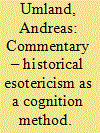

|
|
|
|
|
| Summary/Abstract |
A number of para-academic tendencies in Russian social science helped prepare the Ukraine war. In addition to propaganda and disinformation campaigns by the Kremlin, an intellectual deformation of the Russian elite by the Manichean ideas of such theorists as Lev Gumilyov and Aleksandr Dugin is partly responsible for Russia's increasing secession from Europe. Post-Soviet public discourse has become infected with an array of speculative, often conspiratorial, and sometimes occultist or racist theories. Their proponents have crowded out acknowledged social scientists and historians from intellectual and media debates. This parallel public discourse has been developing since the beginning of glasnost, 35 years ago, and became one of the determinants of Russia's attack on Ukraine in 2014.
|
|
|
|
|
|
|
|
|
|
|
|
|
|
|
|
| 2 |
ID:
193262
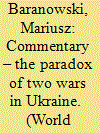

|
|
|
|
|
| Summary/Abstract |
The central thesis of this commentary focuses on the paradox of two wars occurring in parallel with Russian aggression in Ukraine. It is not just that—in addition to military action—there is a geopolitical tsunami and its consequences in the form of a possible food crisis, mass migration, or an already open energy war. The paradox relates to the fact that a potential Ukrainian victory could have adverse effects on the welfare of European countries as a consequence of the embargo on Russian hydrocarbons and the need to replace them (assuming there is no return to the ancien régime before the Russian aggression of February 24, 2022). The defeat of the Ukrainians, on the other hand, could lead to a so-called “new opening” and a gradual return to the import of Russian energy resources (which, although they will not obtain the pre-war volume, will provide energy stability for Europe in a period of diversifying contracts and developing investments in renewable energy sources).
|
|
|
|
|
|
|
|
|
|
|
|
|
|
|
|
| 3 |
ID:
193260
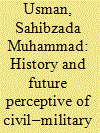

|
|
|
|
|
| Summary/Abstract |
This article examines how civil-military relations have changed in China. This is conducted in the context of long-term efforts to make the military more professional and to understand how civilians and soldiers interact today. Current analyses of Chinese civil-military relations have focused on the military's professionalization. However, the recent evaluations do not entirely include the lessons learned from past professionalization phases in the People's Liberation Army's (PLA) history. I focus on the continuity between different events in China's civil and military history by looking at the critical links that made it possible for military professionalization to change what had happened before between the Chinese Communist Party and the PLA. The potential impact of further professionalization of the PLA in contemporary civil-military interactions is also examined.
|
|
|
|
|
|
|
|
|
|
|
|
|
|
|
|
| 4 |
ID:
193259


|
|
|
|
|
| Summary/Abstract |
This study examines the nexus between governance and human development in Africa. It uses data for the period 2010–2019 and takes into account the existence of spatial dependence and controls for the endogeneity problem through a Generalized Spatial Two Stage Least Squares (2SLS) technique. The exploratory spatial data analysis reveals the existence of spatial dependence on human development and governance quality. Our empirical findings support that in Africa, “good fences make good neighbors,” or proximity matters in the distribution of human development. Implications are discussed. This study complements the extant literature by using more updated data and employing an alternative and more robust estimation approach.
|
|
|
|
|
|
|
|
|
|
|
|
|
|
|
|
| 5 |
ID:
193263


|
|
|
|
|
| Summary/Abstract |
As the situation in Western and Central Ukraine has for now stabilized, a trip to Kyiv can provide those interested in international affairs with a unique opportunity to observe world history in the making.
Back from a two-week trip to Kyiv, I share here my experience of visiting a country that is suffering from Europe's most important war since 1945. I can recommend to people interested in history and politics to visit Ukraine's central and western regions today. One should at once mention, however, the risks involved in such a private or professional research or experiential trip. Going to a war-torn country is more than extreme tourism.
|
|
|
|
|
|
|
|
|
|
|
|
|
|
|
|
| 6 |
ID:
193255


|
|
|
|
|
| Summary/Abstract |
Article 8 of the Paris Agreement introduces obligations upon the Parties to the Agreement “with respect to Loss and Damage associated with adverse impacts of climate change.” According to Paragraph 52 of the Conference of the Parties’ Decision, Article 8 is not a basis for liability or compensation. Therefore, the problem is whether violation of obligations leads to a state responsibility. Using a dogmatic method, this research contends that “recognizing the significance of averting, minimizing, and addressing Loss and Damage” means acceptance of responsibility for a breach of obligations. Although the means of seeking reparation would not be compensation, States are obliged to eliminate sources of damage and take precautionary measures to address loss and damage. Notwithstanding this, placing the issue of loss and damage under the Agreement into a separate article can reflect to a great extent the significance of the matter.
|
|
|
|
|
|
|
|
|
|
|
|
|
|
|
|
| 7 |
ID:
193258
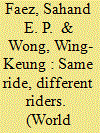

|
|
|
|
|
| Summary/Abstract |
Mainstream international relations definitions commonly assume that states are identical units in a constant state of competition for survival to increase their power. Yet, such a one-sided approach fails to fully consider that the internal structures and contexts of states at different times and under different leaders exert considerable effects on how states act in the international arena and on the foreign policies that shape their identities, priorities, and thus relations with other states. We begin by questioning such theoretical assumptions and then apply a more appropriate reformulation to the case of Turkey's changing trade policy with the European Union (EU). Examining Gül's administration (2007–2014) and Erdoğan's (2014–2020), we look at whether a change in Turkish leadership resulted in a significant change in trade policy and led to a change in the dynamics of its foreign relations approach. Turkey's relations with the members of the EU are assessed (via panel data estimations) as the volume of trade between Turkey and EU members. The data consists of 25 European states’ GDP, Exchange Rate, and Inflation Rate for 2000–2020. We find a significant difference in Turkey's behavior in terms of trade with the EU members between the two administrations under study. This suggests the need to rethink some central theoretical assumptions in certain mainstream international relations perspectives.
|
|
|
|
|
|
|
|
|
|
|
|
|
|
|
|
| 8 |
ID:
193257


|
|
|
|
|
| Summary/Abstract |
Security discussions of the Taliban’s second takeover of Afghanistan center on physical security threats, neglecting the ontological aspect related to how security entails the metaphysics of life—being, feeling alive, or having a sense of self. This article examines this ontological threat to the Afghan people to complement the security discussion and open up more avenues of dialog. I use ontological security to explain the Afghans’ behavior toward the Taliban takeover and ask how does the Taliban takeover of Afghanistan pose a security threat to urban Afghans? Why are urbanite Afghans paranoiac about the Taliban presence to the extent that some choose to die by falling from a moving aircraft? I use the ontological security analytical framework and discursive approach to finding answers. I argue that the Taliban takeover creates ontological insecurity that threatens urban Afghans’ sense of ordinary living or being in the world. Specifically, ontological insecurity creates significant and chronic uncertainties and dangers to Afghans. This is especially so regarding the urbanites with higher socioeconomic status, whose being in the world is threatened as their ordinary living conditions are likely to be contested by the Taliban. The contest is asymmetric, favoring the Taliban. Such uncertainty of existential conditions leads to mistrust of Urban Afghans’ basic sense of safety and a misrecognition of their true identity. Thus, their actions and behaviors have been consequent attempts to respond to the anxieties and risks to their existential position. This work contributes to the ontological security literature, helping fill the gap in the security discussions in international relations and serves policy relevance.
|
|
|
|
|
|
|
|
|
|
|
|
|
|
|
|
| 9 |
ID:
193254
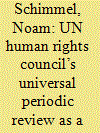

|
|
|
|
|
| Summary/Abstract |
Applying the case study of Saudi Arabia, this article examines the rhetoric of nations who are well documented as being severe violators of human rights and the use they make of the UN Human Rights Council Universal Periodic Review (UPR) mechanism to defend, downplay, and deny their human rights violations. Authoritarian countries who violate human rights systemically, severely, and intentionally as a matter of government policy apply different rhetorical strategies when undergoing the UPR process and writing and submitting their respective national reports for the UPR process. This article analyzes these strategies, illustrates how different countries use them during the UPR process, and explores the value and limitations of the UPR process and its efficacy at advancing human rights.
|
|
|
|
|
|
|
|
|
|
|
|
|
|
|
|
| 10 |
ID:
193256


|
|
|
|
|
| Summary/Abstract |
This study examines the dynamics of gray zone warfare by analyzing its conceptualization in the literature and through its practice in several recent examples. Ever-increasing changes in the characteristics of contemporary warfare have complicated the security environment of the 21st century. Modern warfare inclines toward non-kinetic dimensions based on the principles of hybridity, soft power, and ambiguity. This changing nature of warfare has been defined and categorized in diverse ways, leading to numerous perspectives revealing more confusion than clarity. The terms “hybrid warfare,” “gray zone warfare,” “unrestricted warfare,” and “ambiguous warfare” have received unprecedented attention in recent years. A key contemporary challenge is to differentiate between war and peace because gray zone warfare occupies the space in between both these situations. Many contemporary conflicts are neither black nor white; instead, they fall in the middle of the two: the gray zone. These factors underscore the significance of evaluating and understanding the concept of gray zone warfare. The United States considers Russia, China, and Iran as revisionist states that employ gray zone warfare in various domains to challenge the United States-led world order. South Asia is also a manifested playground of gray zone warfare. The research further distinguishes between gray zone warfare and hybrid warfare and proposes strategies for countering this threat.
|
|
|
|
|
|
|
|
|
|
|
|
|
|
|
|
|
|
|
|
|